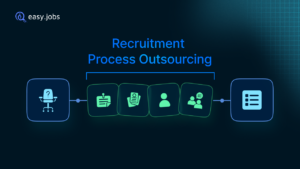Employee Experience (EX) is a comprehensive term in corporate carrying immense value. In today’s competitive job market, fostering a positive employee experience has established itself as an important strategy for companies and modern workplaces to stand out. In this blog, we will discuss EX, its importance and strategies to build an exceptional employee journey in 2026.

What is Employee Experience (EX)?
Employee experience is the combination of all interactions and engagements an employee has with his employer. It encompasses every touchpoint throughout the entire employee lifecycle. Starting from his recruitment, it covers everything including the onboarding process, ongoing work experiences, his career development journey, and everything till his offboarding including his exit interviews. Ex includes physical, emotional, cultural, and technological aspects of the workplace environment.
For running an organization successfully, it is very important to have a positive employee experience because it directly impacts employee engagement, retention, productivity, and overall well-being. By focusing on creating a positive EX, you can attract and retain top talent for your organization, enhance employee engagement and productivity, and ultimately achieve their business goals more effectively. Have a look below to see the key elements of a good employee experience.
Work Environment: The work environment of a physical workspace is one major factor. It includes office layout, facilities, and amenities, as well as the organizational culture and values that can ensure employees have a comfortable and secure experience at work.
Leadership and Management: Employee satisfaction and engagement significantly depend on strong leadership, mentorship, guidance and effective management practices.
Career Development: Growth, learning, and advancement opportunities are essential for employees to feel valued and invested in the long-term career paths within the company.
Work-Life Balance: By prioritizing work-life balance through flexible office hours, work arrangements, paid time off, and supportive policies, you can foster a healthier and more productive workforce for tour organizations.
Recognition and Rewards: Acknowledging employees’ contributions through recognition programs, rewards, and incentives can boost morale and motivation.
Employee Benefits: Offering support and incentives, it enhances overall well-being. From healthcare to professional development opportunities, employee benefits play a vital role in shaping a positive and fulfilling work environment.
Communication and Feedback: Open, transparent communication channels and constructive feedback mechanisms enable employees to voice their concerns, share ideas, and feel heard and valued.
Technology and Tools: Providing employees with the necessary tools, resources, and technology to perform their jobs efficiently and effectively is crucial for a positive employee experience.
Wellness and Support: Offering wellness programs, mental health support, and access to resources for managing stress and personal challenges demonstrates care for employees’ holistic well-being.
5 Reasons Why Employee Experience Is Important
Employee experience is important for multiple reasons. Here, we are discussing 5 top reasons to promote positive employee experiences in your organization. Have a look below.
Enhanced Productivity
A positive employee experience facilitates a conducive work environment, fostering motivation, engagement, and a sense of purpose among employees. When employees feel valued and supported, they are more inclined to invest their energy and creativity into the work they are supposed to do. It increases productivity levels and proactiveness in the organization.
Talent Attraction and Retention
In the competitive talent acquisition era, organizations with positive employee experience gain a competitive edge in attracting top-tier professionals. Moreover, a nurturing environment significantly contributes to employee retention, reducing turnover rates and associated costs.
Organizational Culture and Brand Reputation
Employee experience plays a pivotal role in shaping organizational culture and brand perception. A workplace known for its employee-centric approach can easily attract top talent and cultivate a positive brand reputation. It strengthens brand loyalty among consumers and stakeholders.
Innovation and Agility
An organization with positive employee experience offers a culture of innovation and continuous learning support. It helps to empower employees to explore new ideas and approaches fearlessly. This fosters organizational agility, enabling swift adaptation to market changes and driving sustained growth.
Employee Well-being and Mental Health
Prioritizing employee well-being and mental health is integral to a holistic EX strategy. By offering support mechanisms, promoting work-life balance, and destigmatizing mental health discussions, organizations can nurture a healthier, happier workforce, leading to reduced absenteeism and improved morale.
Stages of Employee Experience

The employee experience journey can be delegated into several stages, including recruitment, onboarding, ongoing engagement, career development, and offboarding. Each stage presents an opportunity for organizations to create meaningful interactions, address pain points, and reinforce their commitment to employee satisfaction and growth.
Recruitment
The recruitment stage sets the tone for the entire employee journey. It’s the first opportunity for organizations to make a positive impression on potential candidates. By crafting compelling job descriptions, streamlining the application process, and offering transparent communication, organizations can attract top talent while reinforcing their employer brand.
Onboarding
Effective onboarding is essential for setting new hires up for success. During this stage, organizations should focus on providing comprehensive orientation, introducing company culture and values, and facilitating connections with colleagues. A well-structured onboarding process accelerates the integration of new employees and helps with early engagement and commitment.
Ongoing Engagement
Sustaining employee engagement beyond the initial onboarding phase is important for long-term retention and productivity. Organizations should invest in initiatives such as regular feedback sessions, recognition programs, and opportunities for collaboration and skill development. By continuously nurturing employee engagement, organizations can create a sense of belonging and commitment among their workforce.
Career Development
Supporting employee growth and advancement is essential for maintaining a motivated and loyal workforce. Organizations should provide avenues for professional development, such as training programs, mentorship opportunities, and clear career paths. By investing in employees’ career progression, organizations help to enhance individual performance and strengthen their talent pipeline.
Offboarding
Even when employees depart, their experience matters and can boost your brand reputation. Offboarding should be handled with care, offering exit interviews to gather feedback, maintaining positive relationships, and providing support in transitioning to new roles. A positive offboarding experience can leave a lasting impression, influencing future perceptions of the organization as well as potential rehiring prospects.
How to Improve the Employee Experience?

With some comprehensive strategy, you can easily improve the employee journey in your organization. There are a few factors that help you to achieve this. Have a look below to see how you can improve the employee experience.
Cultivate a Positive Work Culture
Creating an environment of inclusivity, transparency, and appreciation fosters a sense of belonging and loyalty among employees. When individuals feel valued and respected, they are more likely to be engaged and motivated in their work.
Prioritize Professional Development
Offering avenues for skill development, career growth opportunities, and mentorship programs demonstrates a commitment to employees’ long-term success. Empowering employees to enhance their skills and advance in their careers benefits them individually and strengthens the organization as a whole.
Enhance Communication Channels
Establishing open and transparent communication channels enables employees to voice their opinions, share feedback, and stay informed about organizational updates. Effective communication fosters trust and collaboration, leading to a more cohesive and engaged workforce.
Promote Work-Life Balance
Encouraging a healthy balance between work and personal life through flexible work arrangements, remote work options, and wellness initiatives helps prevent burnout and promotes overall well-being. Employees who feel supported in managing their work-life balance are likely to be more productive and satisfied in their roles.
Invest in Technology and Tools
Providing employees with access to user-friendly digital tools and resources streamlines processes, enhances efficiency, and promotes collaboration. Investing in technology that meets the needs of employees enables them to perform their tasks more effectively and contributes to a smoother work experience.
Employee Experience Solution: Why You Should Invest in Tools?
Well, now you already know how important having a positive employee experience is for organizations. One of the best ways to create this in a workplace is to use a tool as a solution. Investing in robust EX solutions is imperative for organizations seeking to optimize their workforce potential and drive sustainable growth. Have a look below and see why you should invest in tools for a positive employee experience.
Data-Driven Insights: Employee experience solutions provide valuable data and analytics to understand workforce sentiment, identify trends, and pinpoint areas for improvement.
Enhanced Employee Engagement: By leveraging technology and tailored platforms, organizations can have meaningful interactions and boost employee engagement across various touchpoints.
Streamlined Processes: EX solutions streamline administrative tasks, automate workflows, and provide self-service options, allowing HR teams to focus on strategic initiatives and employee development.
Personalized Experiences: These tools enable organizations to deliver personalized experiences tailored to individual preferences, driving satisfaction and loyalty among employees.
Competitive Advantage: Investing in employee experience solutions demonstrates a commitment to employee well-being and organizational excellence, giving companies a competitive edge in attracting and retaining top talent in a fiercely competitive market.
BONUS: Explore easy.jobs HR SaaS Tool
easy.jobs is an innovative recruitment tool that helps in the hiring process. It offers a seamless experience for both employers and job seekers. With its user-friendly interface and robust features, easy.jobs streamlines the process of talent acquisition. It saves time and effort for businesses while connecting them with top talent effortlessly.
Exclusive features:
- Helps to onboard a team entirely in every step
- Provide visual pipelines for hiring
- Provides insightful reports from analytics
- Helps in smart candidate selection process
- Streamlines interview process and makes it interactive
- Allows preparing branded company profiles
- Offers customizing personalized career page
easy.jobs is a freemium SaaS tool. It also has a WordPress plugin. To explore more features, you can try out the free version. You can upgrade to the premium version anytime. Here’s the pricing plan.
Time to Create a Positive Employee Experience
In 2026, as organizations navigate the evolving landscape of work dynamics, prioritizing Employee Experience emerges as a strategic imperative rather than a discretionary effort. By investing in EX, organizations can foster a thriving workplace culture and unlock the full potential of their most valuable asset—their people. As we march forward, let us embark on a journey to create an exceptional EX, where every employee feels empowered, inspired, and deeply connected to their organization’s mission and vision.
Do you think this article is helpful? Share your thoughts in the comment section. For more career-related articles, subscribe to our blog. Also, join us on our Facebook community to interact with more people.






